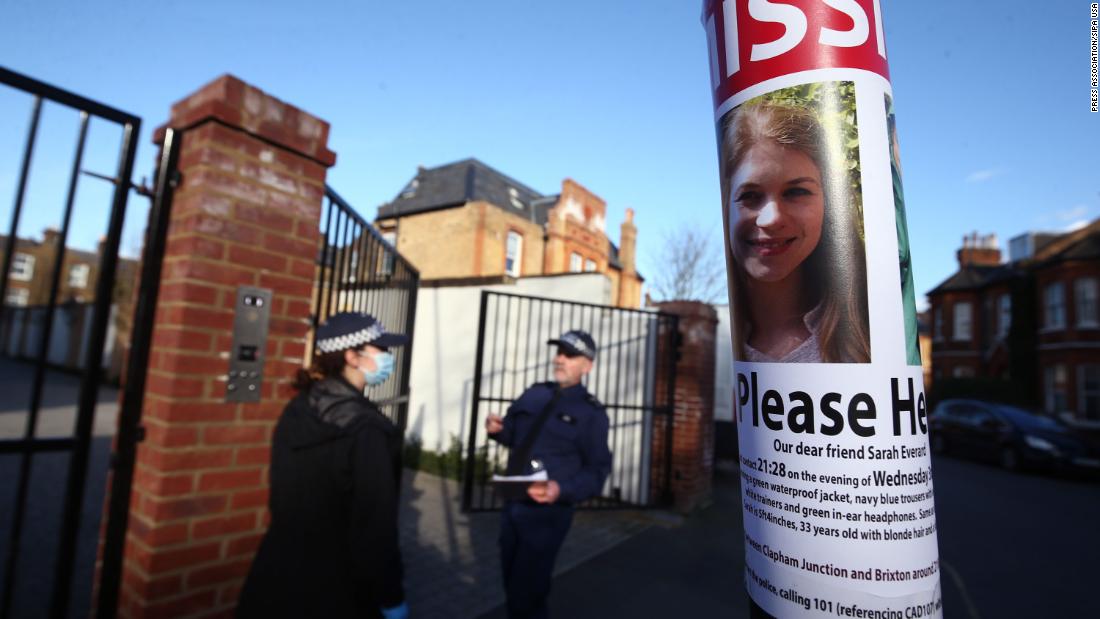Many also exchanged notes about the usual precautions they take to try to stay safe when they walk alone – and expressed their anger and frustration that this seems necessary.
But, she added, “I fully understand that despite this, women in London and the general public – particularly those in the area where Sarah has disappeared – will be concerned and may well be afraid.”
The deluge of reaction from social media provides ample evidence of women’s concerns and is a testament to the price that a lifetime of surveillance has on women’s well-being.
From taking a longer way home to avoid poorly lit streets to taking into account the possible need to escape while dressing for an evening out, women are making constant risk assessments when they walk alone, especially at night.
Another Twitter user, Linda Redford, replied: “This is a constant concern for women and girls of all ages; I am 74 years old and still do the mental risk assessment every time I am alone, especially, but not exclusively, at night . I taught my daughters the same. Fear has passed from woman to girl, through generations. “
Other women responded with their own depressing lists. After posting hers, Eleanor Johnston, a clinical psychologist, added: “My first experiences are not uncommon. What is important to remember is that ‘men’ are not inherently dangerous! Some men are. If this conversation can help us all start a conversation about reporting this behavior, we would all feel much safer. “
Sexual harassment
Although abduction cases are relatively rare in the UK, new research indicates that harassment and sexual abuse are not.
The organization’s research also suggested that women have little faith in public institutions to deal with the situation.
“Only 4% of women told us that they reported harassment incidents to an official organization – with 45% of women saying that they did not believe that the complaint would help change anything,” said UN Women in the United Kingdom.
‘No woman finds this shocking’
The disclosure on social networks in relation to the Everard case speaks for itself.
While some expressed their frustration at the persistence of blaming the victims, others highlighted how, again, it was women who were being urged to change their behavior to be safe, rather than falling on men.
“Perhaps we would see more about street safety if it were men losing their freedom, not women.”
In another tweet on Thursday, she added: “No woman finds this shocking. Because we are constantly planning and strategizing to prioritize our safety. In the meantime, men are just living their lives and having carefree conversations. The very idea of this type freedom is intoxicating for me. “
Call to action
Men also participate in the conversation on Twitter, many in a positive way.
The women responded with satisfaction to the question being asked and offered practical suggestions, such as a man stepping back or crossing the street to assure a woman that she was not being followed, or to offer to accompany a friend home.
Meanwhile, opposition Labor MP MP Jess Phillips called for tougher action to be taken against those who commit crimes against women, noting that convictions for rape and domestic violence cases fell last year.
Dick, the highest-ranking police officer in London, said there would be “continuous high levels of police patrols” in south London, where Everard was last seen, and acknowledged the impact of a suspected police involvement in trust of the public.
“Sarah’s disappearance in these terrible and perverse circumstances is the family’s worst nightmare,” she said.
“Today’s news that he was a metropolitan police officer arrested on suspicion of Sarah’s murder sent waves of shock and anger through the public and the entire Met.
